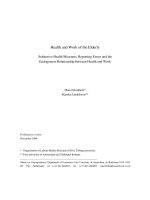THE BIGGEST MYTHS ABOUT ACNE ITS CAUSE, AND ITS TREATMENT
Bạn đang xem bản rút gọn của tài liệu. Xem và tải ngay bản đầy đủ của tài liệu tại đây (98.82 KB, 10 trang )
THE BIGGEST MYTHS ABOUT ACNE ITS CAUSE, AND ITS TREATMENT
Acne is a very difficult condition for anyone; it's embarrassing, frustrating, and
typically downright ugly. An acne sufferer can have their self-esteem eroded and
have virtually no confidence when it comes to their career, with meeting new
people, with personal relationships, and their everyday activities. For some acne
is just a minor inconvenience but for many, their acne can define their entire
personality and identity.
This of course is very sad and tragic for many people who really don't deserve to
be treated differently or judged because of their poor condition of their skin. It's
difficult enough to handle a job or career, have a personal relationship, and form
new friendships just as it is; the added problem of being so aware of one's acne
and appearance can make these things that much worse!
It's also very unfortunate that many people try various things to treat their acne
and get no results, and other people have their own opinions about these
treatment options as well. Many assume that you just need to wash your face on
a daily basis or cut chocolate out of your diet, or something else that is just as
useless. When those with the acne try these things and get no results, they of
course are very frustrated and irritated. When those who don't have the acne
assume these things, they can easily start to look down on those who do, thinking
that they're just ignoring their hygiene or are too lazy to take care of themselves.
There are a few reasons why it's important to actually find out why acne occurs
and what someone can do about it, and not just because of the stigma of acne and
what people think about those who have it. If you are not treating acne correctly
or have wrong ideas about what causes it, then of course you're not going to fix it.
It's just like any other physical problem or concern you may have - if you don't
figure out why you really have that pain in your knee you'll never get the proper
treatment. If you don't find out what that rash on your leg really is, it will never
go away. And so with acne; if you don't find out the truth about why it happens
and what to do about it, you're never going to be able to clear it up.
There are a lot of very common myths and misconceptions about what acne really
is, what causes it, and what someone can do to treat it. Some of these incorrect
ideas are not just useless when it comes to clearing up one's acne but they can in
some cases even make the condition worse. Using too many products that are
meant for acne, cleaning too often or with improper methods, or making
unnecessary changes to one's diet can all have very negative results.
To really address your acne in a very effective way, it's important to understand
what it is and what causes it, and how to treat it. Let's take a look at some
common myths and misconceptions about acne that many people seem to have.
MISCONCEPTION #1 - A CNE IS CAUSED BY TOO MUCH
OIL ON THE FACE .
Everyone has oil on their skin; without it, the skin would have the texture of dry
leather and would be more prone to cracks, bleeding, and irritation. But while
everyone has oil, not everyone has acne.
It is true that the amount of oil that one has on the face is going to be different
person to person; this is caused partly by genetics. Just like someone who is the
child of dark haired parents is probably going to have dark hair and someone that
has parents with fair skin is going to probably have fair skin, the amount of oil on
your skin, or a tendency to dry skin, or combination skin, or anything else is
going to be influenced at least in part by genetics.
The amount of oil on one's skin is also influenced by diet. Everything that we eat
or drink affects our body's system in one way or another; when you don't have
enough hydration in your system your body is going to be very dry and this
includes your skin. People that are severely dehydrated and malnourished have
skin that is waxy and very dry; their internal organs and muscles can also be
affected as well. Dehydration can cause the blood to be thicker than it should,
which affects one's circulation. Muscles can be starved and therefore weak.
And having too much of anything in the body also affects the system. If you eat
too much sugar of course you'll get sick as the body cannot digest it at one time,
and the blood sugar level spikes as well. When it comes to oil and fat in the diet,
2
having too much will result in it not being digested the way it should and it then
is excreted through the pores, resting on the skin.
But no matter what is causing any amount of excessive oil on the face, there is
something very important to understand about the connection between oil and
acne:
Oily skin doesn't cause acne.
For most people, no matter how much oil they have on the face, it is usually
washed, rinsed, or just wears away through normal everyday activities. A person
can have skin almost literally dripping with oil and still not have acne.
So what's the problem? If it's not oil, then what?
The problem with acne and the only connection between it and oily skin is that
when this oil gets trapped in a hair follicle or skin pore and then allows for the
collection of dirt and bacteria. This too is very normal for most people, and a
simply washing of the face rinses away this problem.
But for someone with acne, something else happens. That collection of dirt, oil,
and bacteria not only gets trapped in that follicle or pore, the skin forms a
covering over it that doesn't allow it to escape so that it forms a sac or bubble,
which we call a pimple. Most people don't have this problem with their skin;
their pores stay open or the hair follicles may get filled with dirt and oil but it
doesn't typically get trapped in there.
This is very important for people with acne to remember. The collection of dirt
and oil isn't the only problem, but rather it's that this dirt and oil is trapped under
that small layer of skin so that it can't be washed away. It's that skin's unnatural
covering that forms over that collection of dirt and oil that causes a pimple; it is
not the dirt and oil itself.
This means that many people have the same exact problems with their skin by
way of dirt and oil that someone with acne does; the person with acne just has
this defect or problem wherein the skin doesn't break or stay open the way it
should in order for that dirt and bacteria to escape.
Some people are very surprised to hear this, thinking that the oil or dirt alone is
what's causing the problem. This thinking can lead to all sorts of problems with
the skin and how one treats the acne, leading us to the next myth about the
condition.
3
MISCONCEPTION #2 - T HE BEST WAY TO TREAT ACNE IS
TO CLEANSE AND CLEANSE AND CLEANSE SOME MORE,
AND TO DO WHATEVER YOU CAN TO DRY UP THE OIL ON
YOUR FACE.
Cleansing and getting rid of excess oil on the face is very important when it comes
to acne treatment; there's no getting around that. But it is a common
misconception that a person with acne should be cleaning their face all the time,
using harsh products and those that dry up the oil on one's face. Let's examine
this issue a bit more in depth and see if we can't separate the fact from the fiction.
First, keep in mind that the body has a very unique way of responding to how we
treat it. When we don't eat enough the body actually start feeding off of its own
muscles for nourishment. It's not unusual for someone with anorexia to have
heart problems and problems with other muscles as their lack of nutrition signals
the body to start getting nourishment some other way. Also, when you don't get
enough hydration the body actually starts to retain water in a sort of conservation
for later. It realizes it's not getting adequate amounts of water that it needs so it
holds onto more; you think that not drinking water means that you'll lose fluid
but it's actually the opposite.
And so it goes with cleansing the face and stripping your skin of oil. The body
produces oil because of genetic programming telling it to do so and because of
what we take in by way of eating, but it also produces oil when it feels the skin
becoming dry. What this means is that if you're cleansing your face too often or
too harshly then the body responds by overcompensating and producing even
more oil than before.
The skin is an organ that needs taking care of, just like everything else on the
body. It's easy for anyone to be frustrated and even angry at one's acne, but
cleaning too hard and too harshly, as well as too often, is not going to fix the
problem and may even make it worse. Let's break these two lines of thinking
down even more:
Cleaning too often does no good.
Remember what we brought out before, that acne is not caused by dirt, oil and
bacteria alone. Instead it's that these things get trapped unnaturally underneat h
the skin.
4
Cleaning your face is an important part of having healthy skin overall and of
course for acne treatment and prevention. If all that dirt and oil getting trapped
is what causes acne then of course you want to clean it out.
But cleaning too much isn't really addressing acne's real cause, which is that skin
being closed over it. You can clean and clean and clean all you want but as long
as those pores and follicles continue to have unbroken skin over them you're
going to have acne. You absolutely cannot keep your face from dirt and oil
perfectly at all times; not unless you want to live in a plastic bubble.
And as we said, everyone has dirt and oil on their face but not everyone gets acne.
Cleaning your face is only part of the problem and part of the solution.
Addressing that problem with the skin covering up over these things is the other
part of the solution to acne.
Constantly stripping your skin of oil only makes the problem worse.
Your skin needs oil to be healthy. Think of how painful it is when your hands are
dry and even cracked and itchy. This is from a lack of moisture. If you tried to
strip your face of all the oil it produces then the skin on your face would be that
unhealthy as well.
In addition, stripping your face of that oil just means that the skin will react by
producing even more. Your skin knows that it needs oil to be healthy so you
getting all that oil off means that the body will react by setting the oil glands into
overdrive.
While this may be confusing and might immediately seem frustrating to some oil helps to cause acne but reducing oil means more acne?!? - it can also be
somewhat of a relief for others. Some acne sufferers clean and clean their skin
and use all the products on the market they can get their hands on, and then
seem to see even more oil than when they started. But now you know why! All of
those products and using them too often and too roughly is causing your body to
react by producing more oil as something of a protection for itself. It doesn't
know that you're just trying to get rid of your acne; it only knows that it needs
that precious oil to keep the skin soft, so when you strip the skin of it, the body
just produces more.
Over-cleaning and using harsh products can also irritate the skin so that it
becomes red, uneven, and blotchy. Think of the last time you skinned your knee
or scraped your hand against something - didn't it become inflamed and
irritated? But you're actually doing much the same thing when you use cleansers
5
and other products that are harsh and damaging or when you use them far too
often.
MISCONCEPTION #3 - A CNE IS A YOUNG PERSON' S
DISEASE; YOU'LL JUST EVENTUALLY GROW OUT OF IT .
There are probably a lot of acne sufferers in their thirties and forties, and even
older than that, who would beg to disagree with this!
It's true that many teenagers do suffer from acne and that many do seem to grow
out of this condition as they get older. But of course there is no guarantee that
this will happen and there are millions of a cne sufferers that are well past their
teenaged years. So what is the connection between teens, acne, and the idea of
growing out of it; why is this true for some while others continue to be plagued by
this problem for decades?
There are a few things to keep in mind about this particular line of thinking. The
first is that it's true that very often a teenager's hormones and their typically poor
diet causes a lot more oil to be produced on their face than normal. When a
person gets older their production of oil actually decreases; this is part of what
causes skin to get wrinkled as it gets older. But during the tumultuous teen years,
hormones and the changes their bodies go through while growing can mean that
oil production is "all out of whack." Just like they may go through growth spurts
and mood swings until their bodies become adjusted and "level off," their skin
can produce far too much oil during this time, production that becomes healthier
and more level once adulthood is reached.
But acne is about much more than oil, hormones, and one's diet. That the skin
doesn't allow these small pockets of dirt and bacteria to be cleansed away is a
problem that anyone can have at any age. Yes, the spike in oil in one's skin and
extra dirt can contribute to the problem, but it doesn't explain the problem in of
itself. Again, everyone has dirt and oil on their face but not everyone gets acne.
Obviously there is much more to the issue than just the cleanliness or amount of
oil on one's face.
Think of it this way - the face produces oil, which grabs dirt and bacteria, and
then this "mixture" gets caught in pores and follicles. Under normal
circumstances this would get washed or rinsed away in the shower, even if a
person didn't use a cleanser or soap on their face. For those with acne, the skin
forms a barrier over this mixture which then grows into what we call a pimple.
So yes, oil and dirt contribute to the problem but if the skin would open up the
way it should then there would be no pimple. So the elements trapped under the
6
skin and inside a pimple are part of the problem, they're not the entire problem
itself.
MISCONCEPTION #4 - SWEAT, CHOCOLATE, CAFFEINE,
ACIDIC FOODS, MAKEUP, AND STRESS ALL CAUSE ACNE.
This misconception isn't entirely true but it's not entirely false either. Let's look
at it a bit closer to see what we mean by this.
First, when it comes to sweat, remember that it alone doesn't cause acne. Sweat
is simply droplets of water being released by the body to keep it cool. There are
no bacteria or other harmful elements in sweat itself.
When you sweat you do capture bacteria and germs that are already present on
the skin or underneath and this gets wrapped up in some areas of the skin. This
is why your underarms and bottom of your feet have a bad odor when they sweat
- the bacteria that are there are caught in the sweat and released. But when it
comes to sweat on your face, the sweat itself is not causing bacteria or bringing it
to the face in of itself. If your face was clean before your workout, there's
probably no need to use a harsh astringent or cleanser afterwards simply because
you have sweat on your face.
As for chocolate, caffeine, and acidic foods, it is true that these things can
seemingly irritate the face at times but usually this is just for those who have a
certain sensitivity to these foods. If you're allergic to chocolate and the special
oils it contains, your face will probably break out when you eat it. The same can
be said of caffeine and virtually any other type of food you can eat.
Many people eat acidic foods or drink a lot of caffeine and don't have a problem
with acne or ever break out into pimples, so you can see how these foods don't
cause acne just automatically or in of themselves. On the other hand, any one that
notices that they seem to break out after having chocolate or a lot of coffee or any
other food should make a note of that. Just like one person can have allergies
while another person doesn't, you need to be aware of your own system and what
causes reactions with your body and on your face.
When it comes to makeup and other facial products, it's true that at one time
these were made with such skin-irritating ingredients that they did clog the pores
and cause acne. Additives and other ingredients were so harsh that they did what
that defective skin does - form a barrier over pores and hair follicles so that dirt
and oil couldn't escape, resulting in acne. It's true also that many brands of
7
makeup were oil-based so that if someone were prone to acne, the makeup just
made it worse.
Today however dermatologists and makeup manufacturers have come a long way
toward understanding this problem, and most brands are now what is called noncomedogenic, meaning that they don't clog pores. The vast majority are also
water based rather than oil based, so the mixture doesn't clog the pores and cause
an oil buildup on the face.
Of course there are still a few brands, typically the cheapest ones, that have very
bad ingredients that are damaging to the skin and that may still cause acne, but
these are few and far between. If you're using any of the higher end brands then
you shouldn't have a problem. Ask someone at your makeup counter for a
recommendation as to what would be best for your skin, and don't hesit ate to
consider switching even if this means a few more dollars out of your pocket.
After all, your face is something that everyone sees every day, so why not spend a
few more dollars for makeup that will do the job and not cause additional
problems with acne?
Stress and acne.
There does seem to be a link when it comes to stress and acne. There may be a
few reasons for this, but typically it is because the body is reacting to stress by
protecting itself physically.
Usually when a person is in a stressful or panic-inducing situation the body will
respond with that "fight or flight" response, diverting blood from areas such as
the digestive system arms to the important muscles of the legs, readying itself for
a confrontation or to run away.
In much the same way, the body may respond to stressful situations by producing
even more oil on the skin than before. It may be doing this to ready itself for a
physical attack or simply because many of the body's systems get perverted when
under pressure and stress. Blood circulation is affected, as is the amount of
hydration you have in your system. Oxygen reserves can be depleted and even
the muscles can suffer needlessly.
This added oil can result in acne if one is predisposed to having that skin that
doesn't stay open and that allows it to build up in the pores and hair follicles, or if
there is just so much oil on the face that it can't be rinsed away under normal
conditions.
8
MISCONCEPTION #5 - YOU' RE JUST STUCK WITH YOUR
ACNE, SO LEARN TO LIVE WITH IT.
There's really absolutely no reason to think that you need to accept your acne and
just learn to live with it. While some cases seem to be much more stubborn than
others, there really is no case of acne and even the resultant scars that cannot be
treated and addressed, if you know how.
Today there are many different products on the market that address acne and
skin's health overall, and these products are the result of years of study by
dermatologists and others who wanted to learn about acne, its cause, and its
treatment. Even apart from all these commercial products, once a person really
understand what causes acne and what helps to clear it up, he or she can be
assisted tremendously in treating and addressing it properly.
To treat your acne means learning about the skin itself, about how it reacts to dirt
and oil and bacteria, and learning about why some get acne while others don't. It
also involves learning some basics about skin care and what is best for the skin,
what it needs to be healthy and well-nourished, and what makes its condition
worse.
You don't need to be a dermatologist to have this basic understanding and to
make some changes in your skin care routine that will address not only your acne
but your skin's appearance. You don't need years of schooling or to learn all the
chemical properties of skin care treatment options and all these other aspects of
skin care.
This also doesn't mean just using the latest product on the market that promises
to clear your acne and give you beautiful skin, or needing to invest hundreds and
hundreds of dollars into special formulas and treatment options.
What is does mean is being willing to invest the time and effort needed to not
only learn the basics of skin care, but to follow through with a good regimen of
skin care as well. It means needing to exercise some self-control in making
yourself wash your face and apply treatment options when you should, and
avoiding the urge to just scrub your face raw when you shouldn't. It means
putting aside the frustrations and irritations of seeing acne and of not getting
instant results in exchange for the patience needed to realize that it may take a
little bit of time to see those results.
But of course those results are worth every effort. Those who have been plagued
with acne their entire life have found that with the right regimen and the right
9
understanding of their skin, they eventually have skin that is healthy, radiant,
and relatively free of acne.
This investment of time and effort can work for you as well. It doesn't matter
how long you've suffered from acne, how bad it is, or what else you've tried. All
that matters is that you're willing to do what's necessary to achieve the look you
desire, so that you can face the mirror and the world with confidence.
Don't give up just yet; learning about common myths and misconceptions of acne
is just half the battle. Learning how to set aside these myths in exchange for
accurate knowledge is the other half of the battle. But it can be done; you can
have clear skin, if you're willing to do your part.
10









